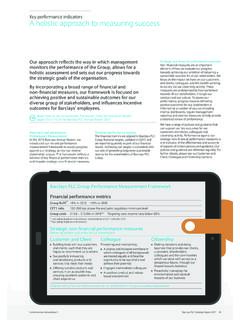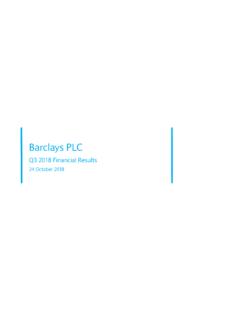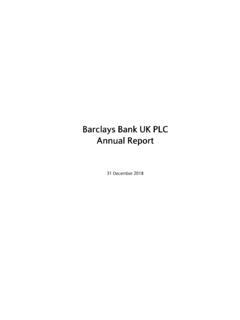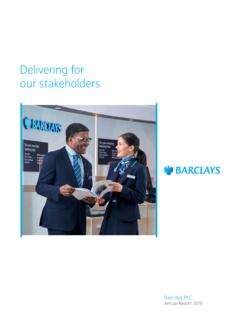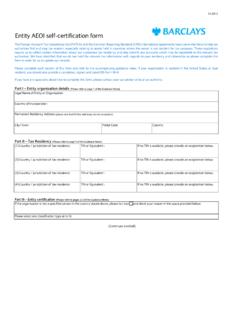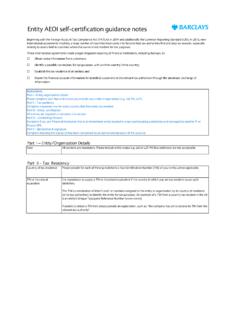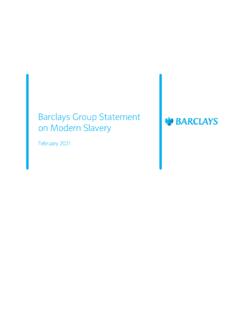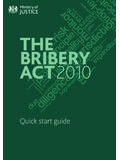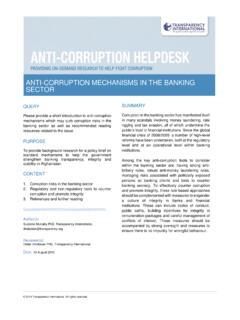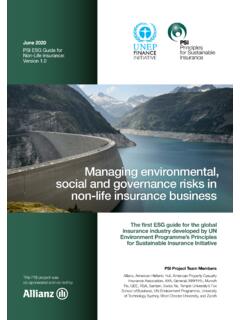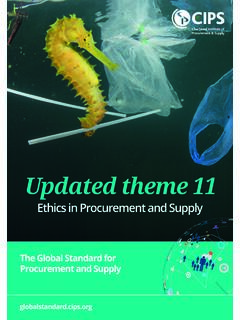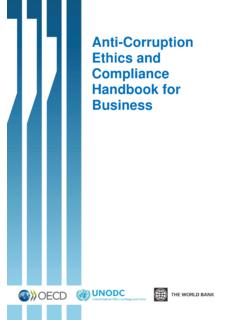Transcription of Sanctions Standard ATEF Standard - Barclays
1 1 Barclays Financial Crime Compliance Statement (ABC, AML, Anti-Tax Evasion Facilitation and Sanctions ) Barclays recognises that economic crimes have an adverse effect on individuals and communities wherever they occur. Endemic economic crime (particularly when associated with organised crime and terrorist financing) can threaten laws, democratic processes and basic human freedoms, impoverishing states and distorting free trade and competition. Barclays is committed to conducting its global activities with integrity and respecting its regulatory, ethical and social responsibilities to: Protect customers, employees, and others with whom we do business; and Support governments, regulators, and law enforcement in wider economic crime prevention. We will not tolerate any deliberate breach of financial crime laws and regulations ( bribery , corruption , and money laundering, Sanctions , or tax evasion facilitation) that apply to our business and the transactions we undertake.
2 Barclays has a dedicated global Financial Crime function, which sits within Compliance. The Financial Crime function facilitates risk-based, effective and efficient financial crime risk management by providing expert support and oversight to the business and our legal entities ( Barclays Bank UK PLC and Barclays Bank PLC operate alongside, but independently from one another as part of the Barclays Group under the listed entity, Barclays PLC). We have adopted a holistic approach to Financial Crime and have one group-wide Financial Crime Policy that sets the minimum control requirements in four key risk areas: anti- bribery & corruption (ABC); anti-money laundering & counter-terrorist financing (AML); anti-tax evasion facilitation (ATEF) and Sanctions . This combined approach allows us to identify and manage relevant synergies and connections between the key risk areas. Eleven group-wide Financial Crime Standards and associated risk-based systems & controls support the Financial Crime Policy, which is: Designed to ensure that all Barclays employees, businesses and legal entities comply with all UK, extra-territorial and locally applicable legal and regulatory obligations Supported by the Barclays Board of Directors and applicable to all Barclays legal entities and business dealings globally Approved by the Global Head of Compliance (member of the Executive Committee) Regularly reviewed for content and effectiveness, which provides senior executive management oversight committees and the Board Audit Committee with the necessary assurance regarding the operating effectiveness of the Barclays Financial Crime control framework.
3 ABC Standards (x5)AML Standards (x4) Sanctions Standard ATEF Standard Financial Crime Policy 2 Employees are made aware that failure to comply with the Financial Crime Policy and/or associated Standards may give rise to disciplinary action, up to and including dismissal. For further details of the Barclays approach to Financial Crime compliance and prevention, see the following appendices: Anti- bribery & corruption Appendix A Anti-Money Laundering & Counter-Terrorist Financing Appendix B Anti-Tax Evasion Facilitation Appendix C Sanctions Appendix D Frequently Asked Questions Appendix E. Appendix A Anti- bribery & corruption (ABC) Barclays is subject to the provisions of the UK bribery Act 2010 and the US Foreign Corrupt Practices Act 1977, which have extra-territorial effect globally, as well as to applicable local anti- bribery & corruption laws. The Barclays Financial Crime Policy and ABC Standards apply to all our employees, businesses and legal entities and are designed to ensure that Barclays employees know how to identify and manage the legal, regulatory and reputational risks associated with bribery and corruption .
4 In addition to the general prohibition against engaging in bribery and corruption (giving and receiving), the Standards contain the minimum risk-based control requirements (including ABC review and oversight) that all Barclays businesses, legal entities and employees must follow. The Standards address five key risk areas: Employment and work opportunity employees/prospective employees with connections to external stakeholders and/or Politically Exposed Persons Expenditure how to deal with facilitation payment requests; gifts & entertainment recording/review processes; charitable donations; commercial sponsorships and political donations; Third parties risk assessment, due diligence, contract clauses and review for suppliers of services who are paid to act for and on behalf of Barclays Introducers enhanced risk assessment, due diligence, approval, contract clauses, monitoring and review for suppliers who are paid to introduce new customers/business to Barclays Strategic and principal investments risk assessment, due diligence and contract clause requirements for Barclays proprietary investments.
5 These Standards also provide information about how to obtain guidance/advice and report incidents and form part of a robust ABC control framework, which has been developed to manage our legal, regulatory and reputational risks . This includes activities relating to: assignment of roles and responsibilities; risk assessment; employee training; employee screening; escalation processes; controls testing; assurance and audit. We benchmark our ABC control framework by taking part in expert working groups and external surveys. For example, Transparency International s (TI) Corporate Anti- corruption Benchmark, which measures and compares the performance of corporate ABC programmes in the UK using TI s extensive anti- corruption expertise and the input of experienced specialist practitioners. The Barclays ABC control framework currently holds an A rating. 3 Appendix B Anti-Money Laundering (AML) Money laundering (including terrorist financing and the proliferation of nuclear, chemical or biological weapons) have been identified as major threats to the international financial services community and therefore to Barclays .
6 The UK, in common with many other countries, has passed legislation designed to prevent money laundering and to combat terrorism. This legislation, together with regulations, rules and industry guidance, form the cornerstone of AML obligations for UK firms and outline the offences and penalties for failing to comply. The requirements of EU UK legislation apply to Barclays globally. Group companies may have additional local policies and procedures designed to comply with their local legislation, regulations and any government-approved guidance in the jurisdiction(s) in which they operate. The principal requirements, obligations and penalties currently in force, on which the Barclays AML prevention approach is based, are contained in: The Proceeds of Crime Act 2002 (POCA), as amended The Terrorism Act 2000, as amended The Terrorism Act 2006 The UK Money Laundering Regulations 2017, as amended, transposing the requirements of the EU s Fifth Money Laundering Directive The FCA Handbook of Rules and Guidance (in particular, the Senior Management Arrangements, Systems and Controls (SYSC) Sourcebook, which relates to the management and control of money laundering risk) The Joint Money Laundering Steering group (JMLSG) guidance for the UK financial sector on the prevention of money laundering combating terrorist financing.
7 The Barclays Financial Crime Policy and the four associated AML Standards are designed to ensure that all Barclays businesses and legal entities comply with the requirements and obligations set out in UK and EU legislation, regulations, rules and industry guidance for the financial services sector. This includes the requirement to have adequate systems and controls in place to mitigate the risk of the firm being used to facilitate financial crime. The Standards, which take account of guidance issued by the Wolfsberg Group and the European Banking Authority, focus on four key risk areas: the customer lifecycle; correspondent relationships; politically exposed persons; and wire transfers. The Standards set out the minimum control requirements, which must be complied with by all Barclays businesses and legal entities, including: The appointment of an officer responsible for compliance with the UK Money Laundering Regulations 2017 (as amended), and the appointment of money laundering reporting officers of sufficient seniority, who have responsibility for oversight of business and legal entity compliance with relevant legislation, regulations, rules and industry guidance Establishing and maintaining a risk-based approach towards assessing and managing the money laundering and terrorist financing risks to the group Establishing and maintaining risk-based customer due diligence, identification, verification and know your customer (KYC) procedures, including enhanced due diligence for those customers presenting higher risk, such as.
8 O Politically Exposed Persons (PEPs), 4 o Business relationships and transactions with persons established in countries identified by the EU/UK as having strategic anti-money laundering and counter-terrorist financing deficiencies ( high-risk third countries ), o Correspondent banking relationships, and o When providing tax advice or tax planning services to customers. Appendix C Anti-Tax Evasion Facilitation Barclays takes a zero-tolerance approach to deliberate facilitation of tax evasion in any country and has procedures in place to prevent it. We also expect the same from our employees and third parties providing services for or on our behalf. We comply with the UK Criminal Finances Act 2017 and all applicable tax evasion/tax evasion facilitation laws wherever we do business. Tax evasion is a financial crime and a predicate offence to money laundering in the UK and in many other countries in which we operate.
9 Barclays is committed to: Dealing only with customers who have appropriately declared their assets to the relevant tax authorities Preventing tax evasion facilitation by our employees or third parties acting for or on our behalf. We have an Anti-Tax Evasion Facilitation Standard , which addresses the risks associated with employees and third parties who act for or on behalf of Barclays . This includes: Prohibiting employees from facilitating tax evasion Ensuring that we take account of tax evasion/tax evasion facilitation as red flags for suspicious activity Subjecting third party and introducer/intermediary relationships to specific anti-tax evasion facilitation controls, including risk assessment, due diligence, contract clauses, monitoring and review Information about how to obtain guidance/advice on tax-related matters and report incidents. See also the Barclays Tax Principles. Appendix D Sanctions Sanctions are restrictions on activity with targeted countries, governments, entities, individuals and industries that are imposed by bodies such as the United Nations (UN), the European Union (EU), individual countries or groups of countries.
10 As a global financial institution, Barclays must comply with the legal and regulatory obligations in all the jurisdictions in which we operate. In addition, in order to protect our reputation and other legitimate business interests, in certain circumstances, Barclays Sanctions risk appetite may be stricter than our legal obligations. Together, the Barclays Sanctions programme, along with the Financial Crime Policy and associated Sanctions Standard is designed to ensure that Barclays and its employees know how to identify and manage the legal, 5 regulatory, and reputational risks associated with Sanctions , including the risk of Barclays products and services being used to contravene Sanctions . To achieve this, the programme sets out a robust framework of systems and controls to ensure adherence to all applicable Sanctions regulations in all Barclays businesses and legal entities. This includes controls relating to: roles and responsibilities; defining applicable laws and regulations; risk assessments; employee training; payment, customer and employee screening; escalation processes; controls testing; and independent testing.
